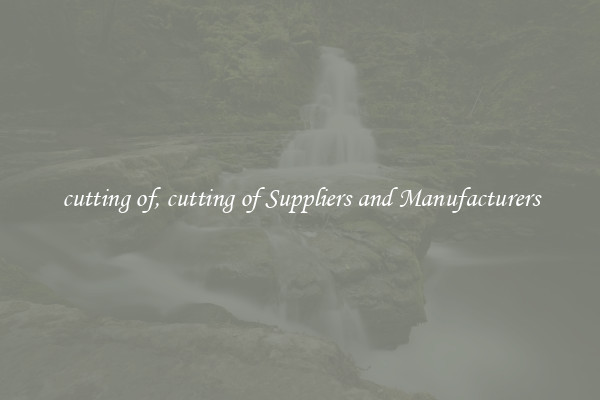cutting of, cutting of Suppliers and Manufacturers
In today's competitive business landscape, companies often find themselves making tough decisions to survive and thrive. One such decision that a company may face is cutting off suppliers and manufacturers. While this may seem harsh, it is sometimes the necessary course of action to ensure the sustainability and growth of the business.

One of the main reasons why a company might choose to cut off suppliers and manufacturers is the need for cost reduction. As businesses constantly strive to improve their bottom line, they may find themselves in a position where they need to find more affordable options. By cutting off existing suppliers and manufacturers, companies can explore alternative options that offer better pricing without compromising the quality of their products or services.
Another reason for cutting off suppliers and manufacturers is the need for better quality or improved products. As businesses evolve, the demand for higher quality goods and services increases. If a supplier or manufacturer fails to meet these standards, it may be necessary to seek out new partners who can deliver the desired outcomes. Cutting off underperforming suppliers and manufacturers allows for greater control over the quality of products while maintaining a competitive edge in the market.
Furthermore, cutting off suppliers and manufacturers can be a strategic move for companies looking to streamline their supply chain and consolidate operations. By working with a fewer number of suppliers and manufacturers, businesses can simplify their procurement process, reduce overhead costs, and improve overall efficiency. This approach often leads to better negotiation power and stronger relationships with trusted partners.
However, the decision to cut off suppliers and manufacturers should not be taken lightly. It is essential for companies to conduct thorough research and analysis before severing ties with existing partners. This involves assessing the financial stability, capacity, and reliability of potential replacements. Companies should also consider the impact on existing relationships and the time and resources necessary for a smooth transition.
Communication is key when cutting off suppliers and manufacturers. Open and honest communication with the affected parties can help mitigate any negative consequences and maintain a positive reputation within the industry. It is important to explain the reasons behind the decision and provide assistance, such as recommendations or referrals, whenever possible.
In conclusion, while cutting off suppliers and manufacturers may be a challenging decision to make, it can ultimately lead to benefits such as cost reduction, improved product quality, and enhanced operational efficiency. To ensure a successful outcome, companies must undertake careful planning, research, and communication during this process. By making strategic choices, businesses can position themselves for long-term success in today's dynamic and competitive business environment.

View details

View details

View details

View details








